Food and Beverage Management: Skills, Laws, and Standards Report
VerifiedAdded on 2023/01/05
|10
|753
|25
Report
AI Summary
This report examines the professional management skills required in food and beverage operations, emphasizing communication, multitasking, and discipline. It also details the legal requirements and regulatory standards that food and beverage service outlets, such as The Savoy, London, must adhere to. These include the Food Standards Act 1999, the Food Safety Act 1990, food hygiene licenses, COSHH regulations 2002, and HACCP. The report highlights the importance of these regulations in maintaining food quality, ensuring customer safety, and building a strong brand image within the hospitality sector. The conclusion emphasizes the role of these regulations in preventing hazards and retaining customers.
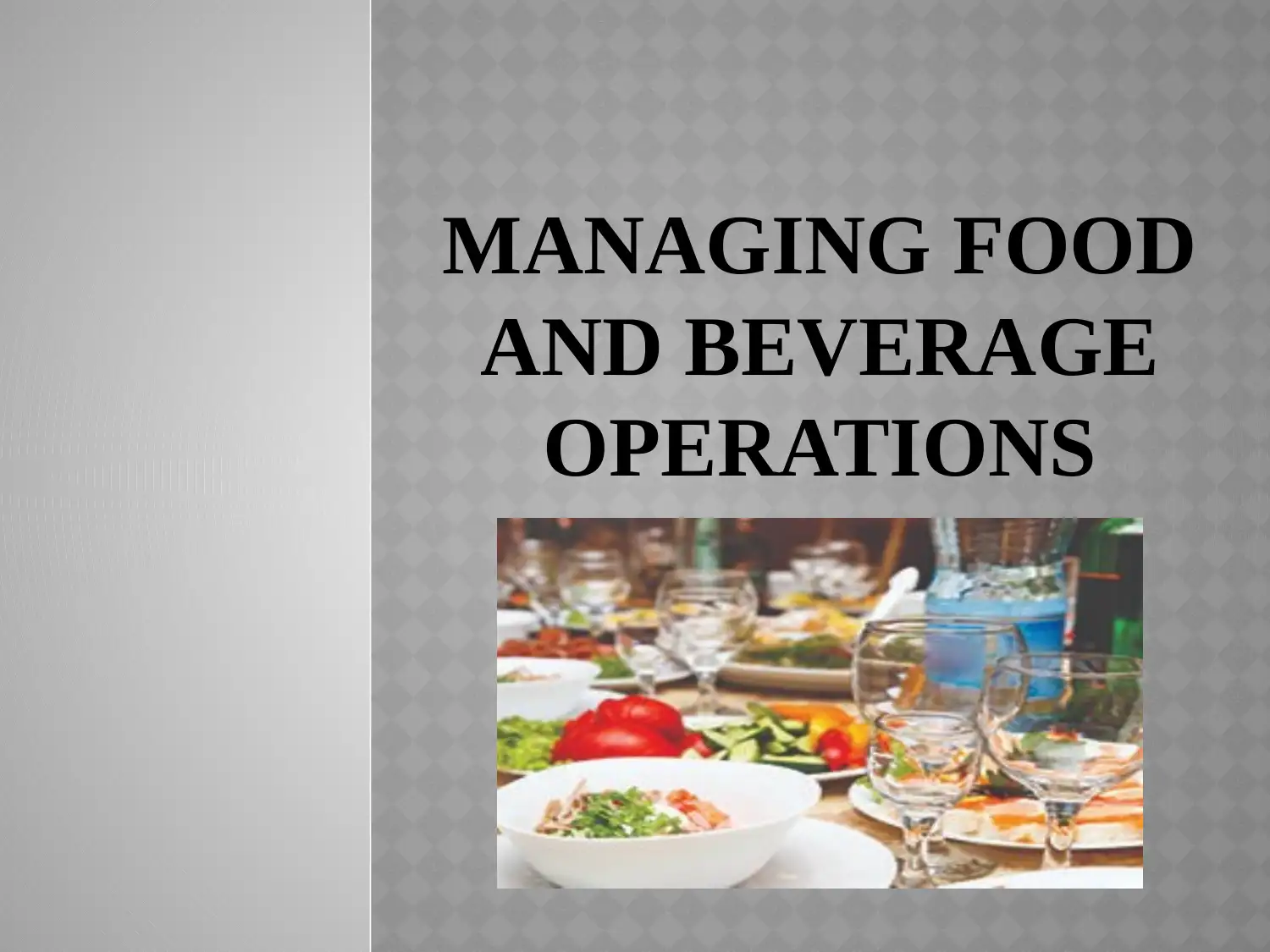
MANAGING FOOD
AND BEVERAGE
OPERATIONS
AND BEVERAGE
OPERATIONS
Paraphrase This Document
Need a fresh take? Get an instant paraphrase of this document with our AI Paraphraser
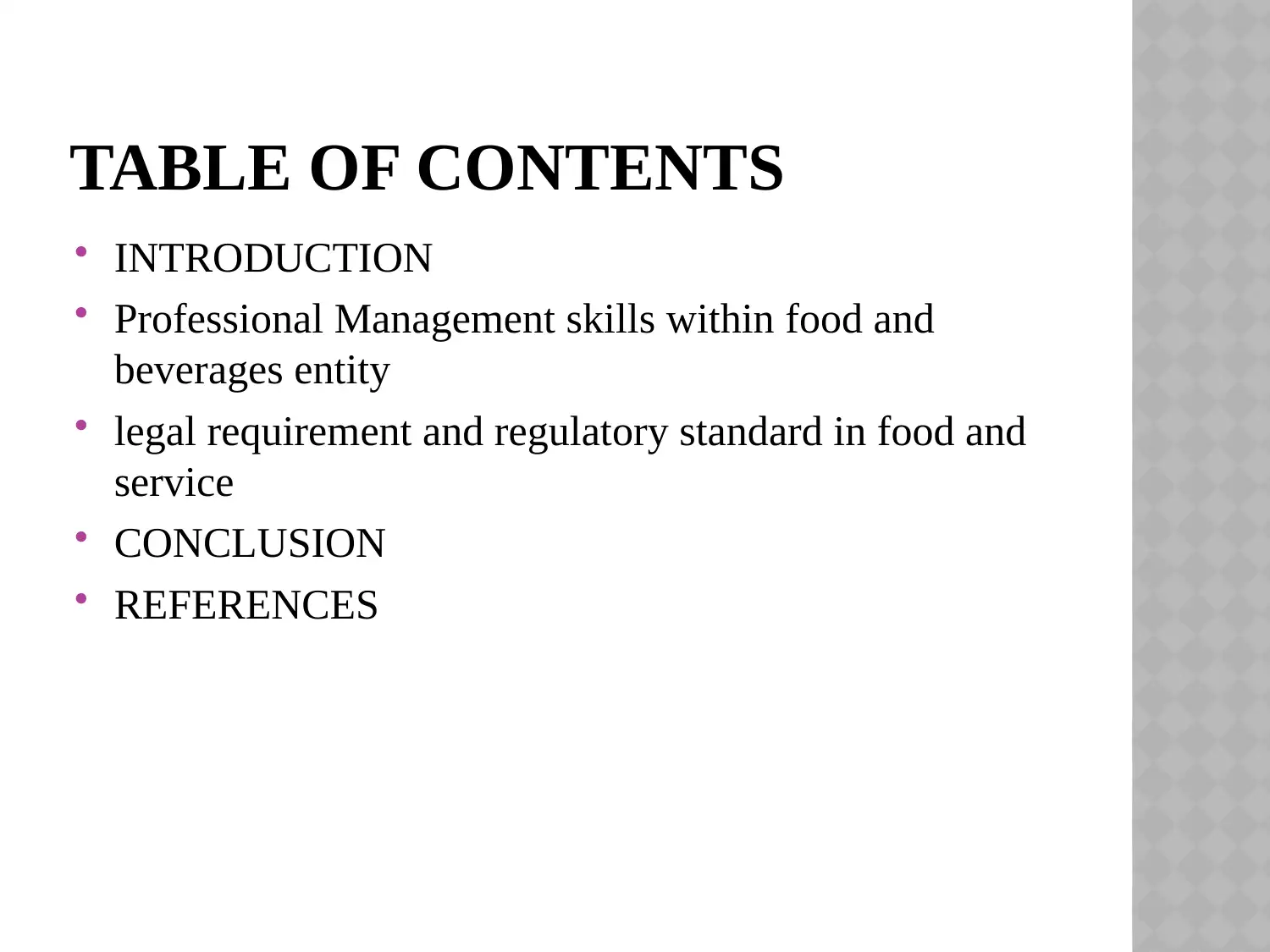
TABLE OF CONTENTS
INTRODUCTION
Professional Management skills within food and
beverages entity
legal requirement and regulatory standard in food and
service
CONCLUSION
REFERENCES
INTRODUCTION
Professional Management skills within food and
beverages entity
legal requirement and regulatory standard in food and
service
CONCLUSION
REFERENCES
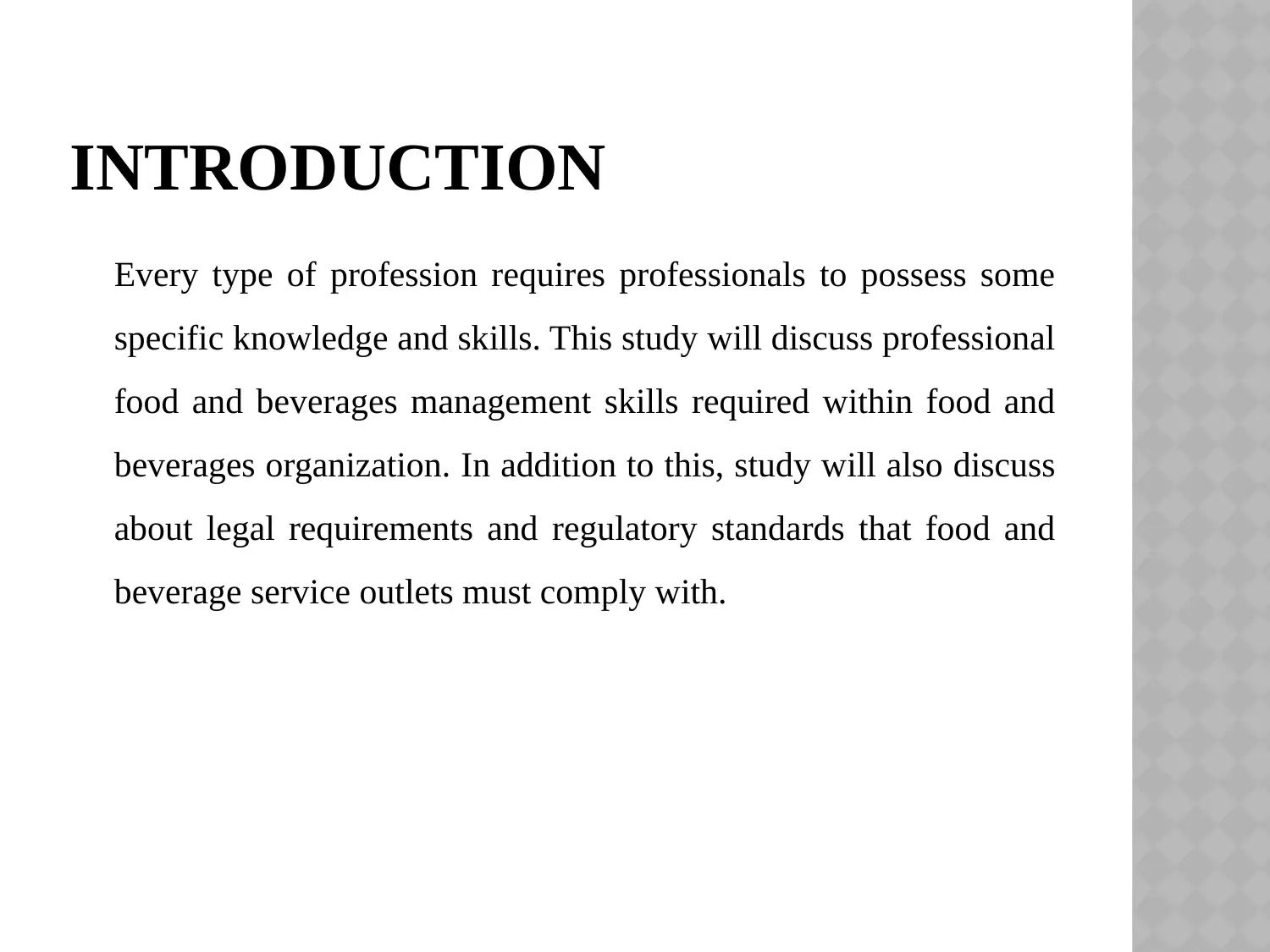
INTRODUCTION
Every type of profession requires professionals to possess some
specific knowledge and skills. This study will discuss professional
food and beverages management skills required within food and
beverages organization. In addition to this, study will also discuss
about legal requirements and regulatory standards that food and
beverage service outlets must comply with.
Every type of profession requires professionals to possess some
specific knowledge and skills. This study will discuss professional
food and beverages management skills required within food and
beverages organization. In addition to this, study will also discuss
about legal requirements and regulatory standards that food and
beverage service outlets must comply with.
⊘ This is a preview!⊘
Do you want full access?
Subscribe today to unlock all pages.

Trusted by 1+ million students worldwide
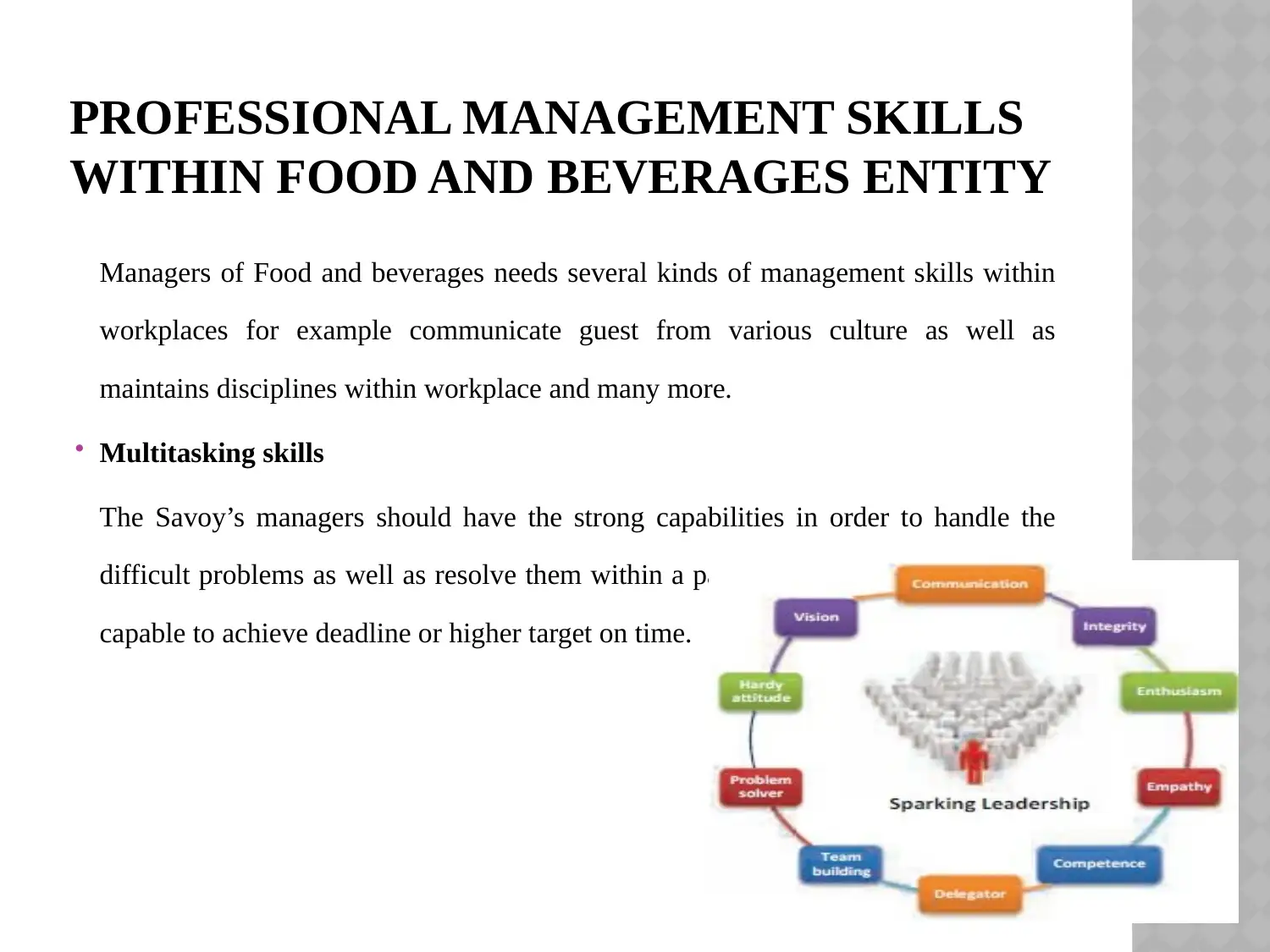
PROFESSIONAL MANAGEMENT SKILLS
WITHIN FOOD AND BEVERAGES ENTITY
Managers of Food and beverages needs several kinds of management skills within
workplaces for example communicate guest from various culture as well as
maintains disciplines within workplace and many more.
Multitasking skills
The Savoy’s managers should have the strong capabilities in order to handle the
difficult problems as well as resolve them within a particular time for firms so that
capable to achieve deadline or higher target on time.
WITHIN FOOD AND BEVERAGES ENTITY
Managers of Food and beverages needs several kinds of management skills within
workplaces for example communicate guest from various culture as well as
maintains disciplines within workplace and many more.
Multitasking skills
The Savoy’s managers should have the strong capabilities in order to handle the
difficult problems as well as resolve them within a particular time for firms so that
capable to achieve deadline or higher target on time.
Paraphrase This Document
Need a fresh take? Get an instant paraphrase of this document with our AI Paraphraser
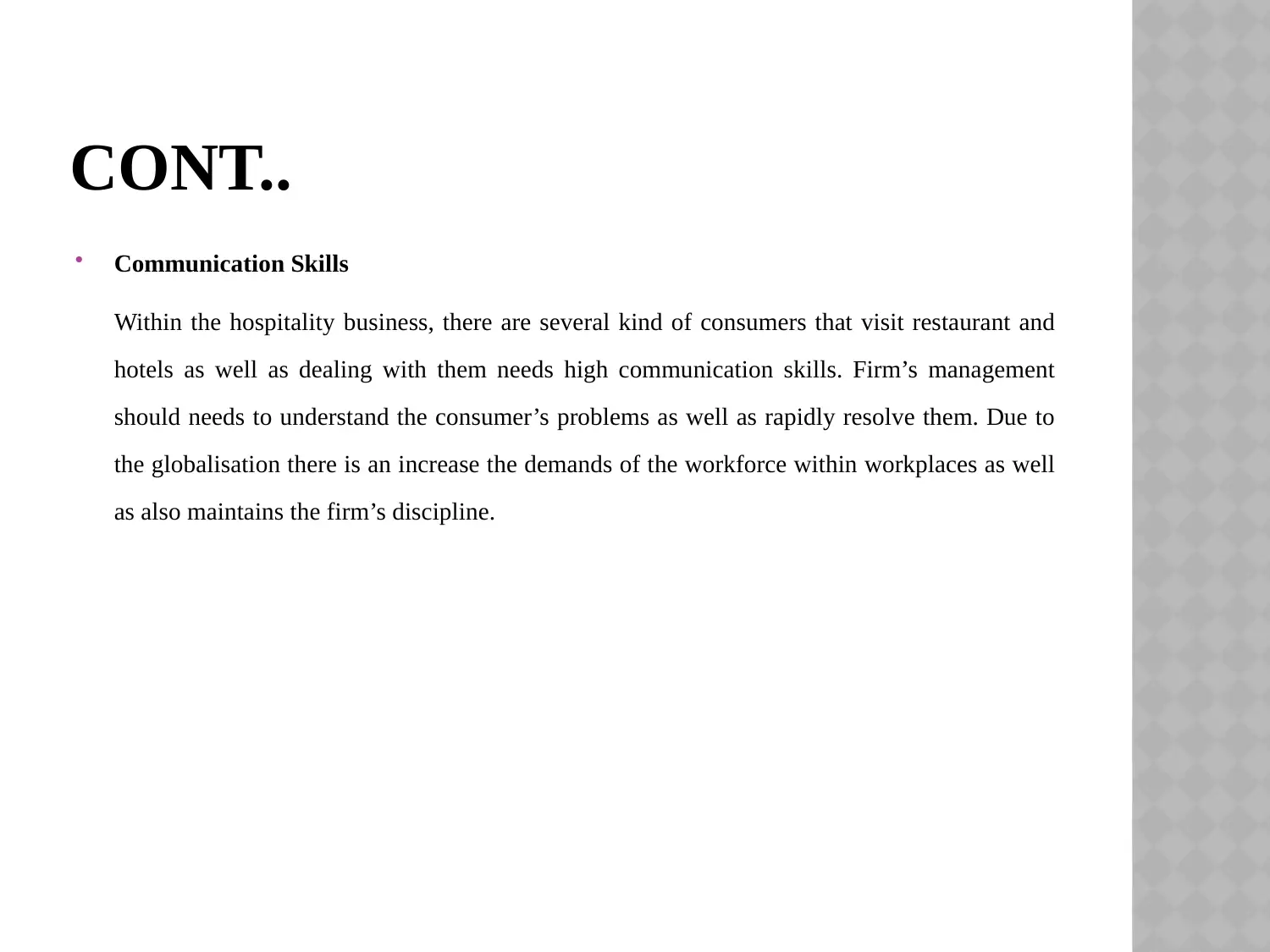
CONT..
Communication Skills
Within the hospitality business, there are several kind of consumers that visit restaurant and
hotels as well as dealing with them needs high communication skills. Firm’s management
should needs to understand the consumer’s problems as well as rapidly resolve them. Due to
the globalisation there is an increase the demands of the workforce within workplaces as well
as also maintains the firm’s discipline.
Communication Skills
Within the hospitality business, there are several kind of consumers that visit restaurant and
hotels as well as dealing with them needs high communication skills. Firm’s management
should needs to understand the consumer’s problems as well as rapidly resolve them. Due to
the globalisation there is an increase the demands of the workforce within workplaces as well
as also maintains the firm’s discipline.
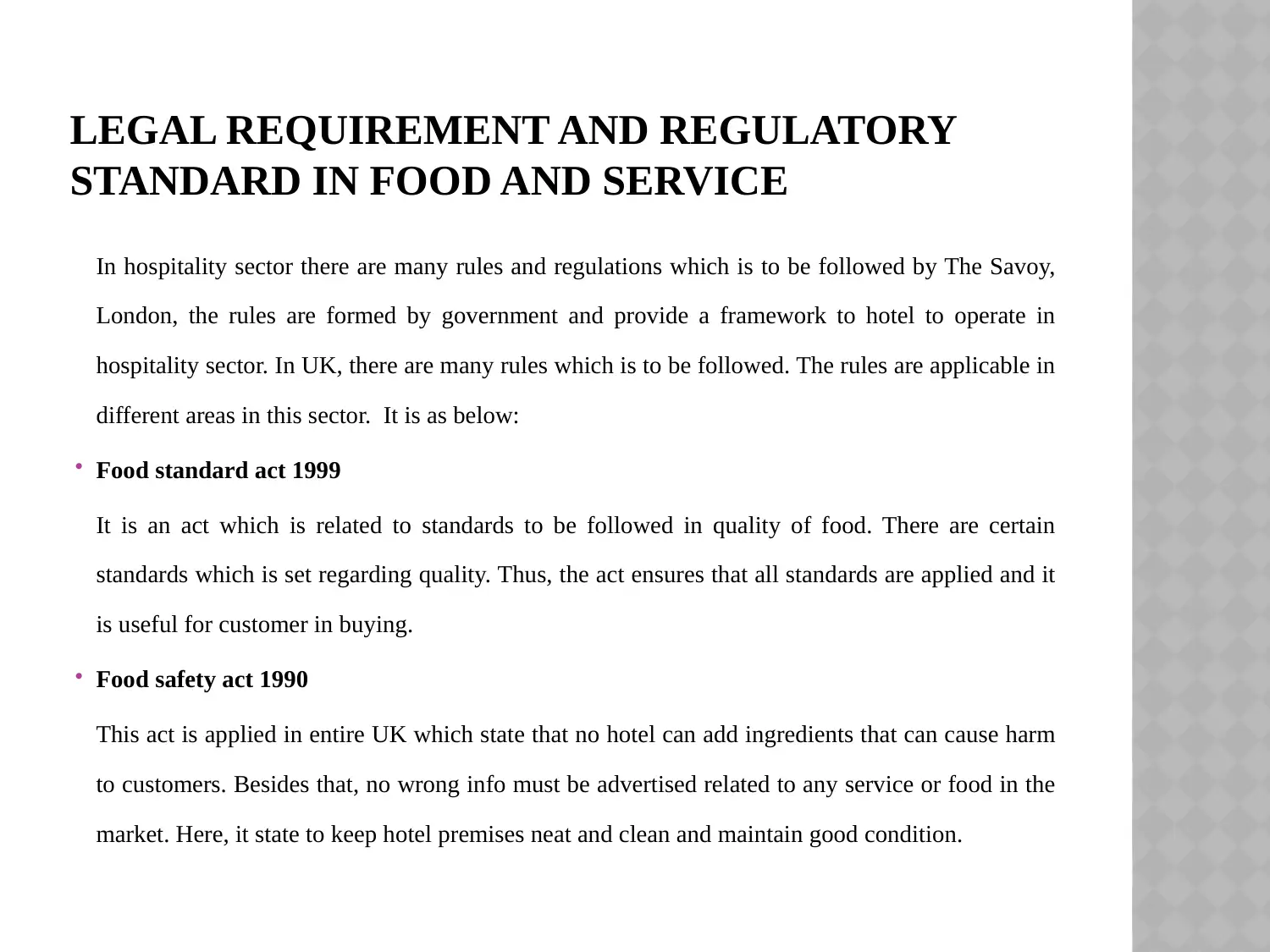
LEGAL REQUIREMENT AND REGULATORY
STANDARD IN FOOD AND SERVICE
In hospitality sector there are many rules and regulations which is to be followed by The Savoy,
London, the rules are formed by government and provide a framework to hotel to operate in
hospitality sector. In UK, there are many rules which is to be followed. The rules are applicable in
different areas in this sector. It is as below:
Food standard act 1999
It is an act which is related to standards to be followed in quality of food. There are certain
standards which is set regarding quality. Thus, the act ensures that all standards are applied and it
is useful for customer in buying.
Food safety act 1990
This act is applied in entire UK which state that no hotel can add ingredients that can cause harm
to customers. Besides that, no wrong info must be advertised related to any service or food in the
market. Here, it state to keep hotel premises neat and clean and maintain good condition.
STANDARD IN FOOD AND SERVICE
In hospitality sector there are many rules and regulations which is to be followed by The Savoy,
London, the rules are formed by government and provide a framework to hotel to operate in
hospitality sector. In UK, there are many rules which is to be followed. The rules are applicable in
different areas in this sector. It is as below:
Food standard act 1999
It is an act which is related to standards to be followed in quality of food. There are certain
standards which is set regarding quality. Thus, the act ensures that all standards are applied and it
is useful for customer in buying.
Food safety act 1990
This act is applied in entire UK which state that no hotel can add ingredients that can cause harm
to customers. Besides that, no wrong info must be advertised related to any service or food in the
market. Here, it state to keep hotel premises neat and clean and maintain good condition.
⊘ This is a preview!⊘
Do you want full access?
Subscribe today to unlock all pages.

Trusted by 1+ million students worldwide
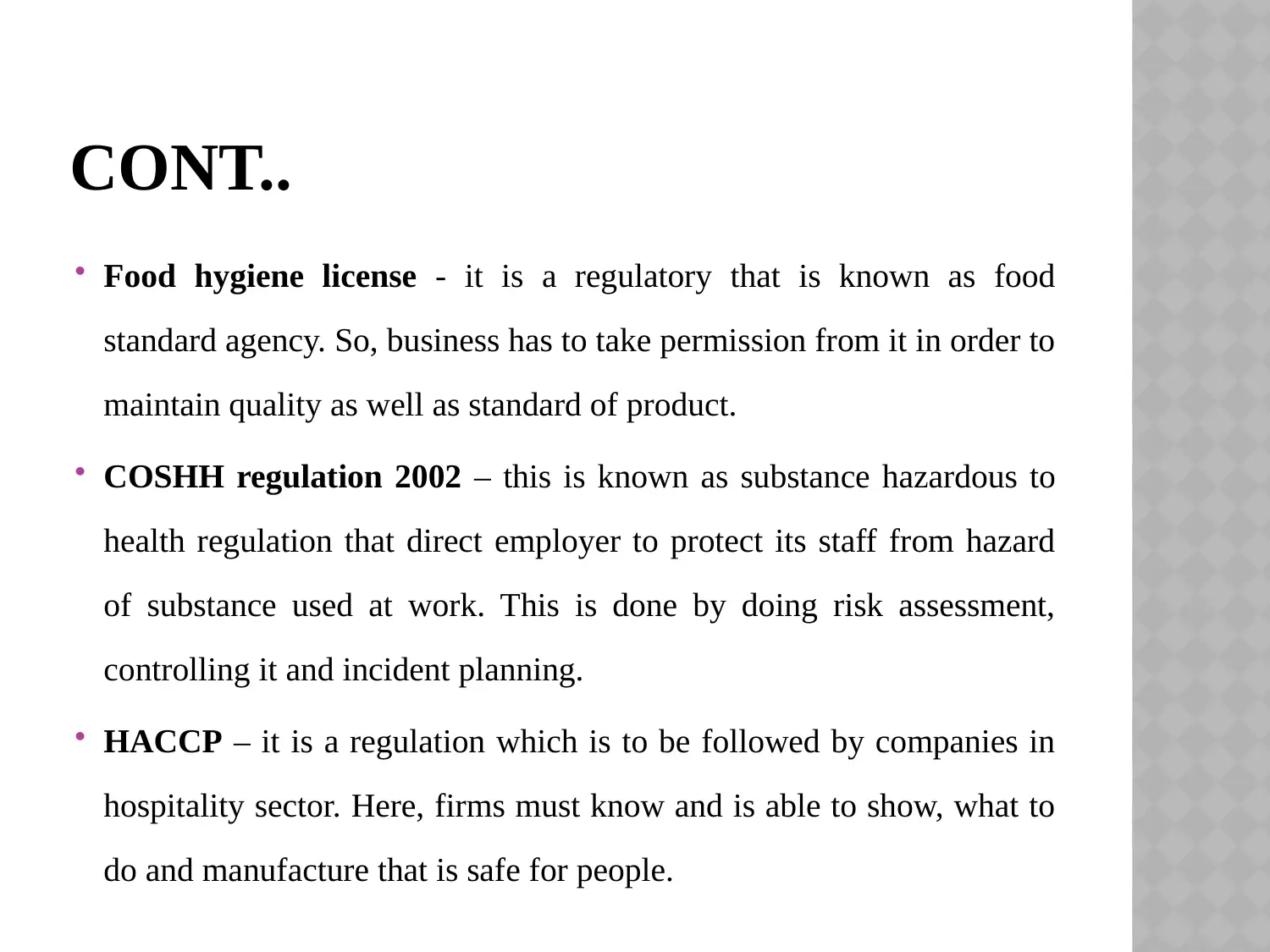
CONT..
Food hygiene license - it is a regulatory that is known as food
standard agency. So, business has to take permission from it in order to
maintain quality as well as standard of product.
COSHH regulation 2002 – this is known as substance hazardous to
health regulation that direct employer to protect its staff from hazard
of substance used at work. This is done by doing risk assessment,
controlling it and incident planning.
HACCP – it is a regulation which is to be followed by companies in
hospitality sector. Here, firms must know and is able to show, what to
do and manufacture that is safe for people.
Food hygiene license - it is a regulatory that is known as food
standard agency. So, business has to take permission from it in order to
maintain quality as well as standard of product.
COSHH regulation 2002 – this is known as substance hazardous to
health regulation that direct employer to protect its staff from hazard
of substance used at work. This is done by doing risk assessment,
controlling it and incident planning.
HACCP – it is a regulation which is to be followed by companies in
hospitality sector. Here, firms must know and is able to show, what to
do and manufacture that is safe for people.
Paraphrase This Document
Need a fresh take? Get an instant paraphrase of this document with our AI Paraphraser
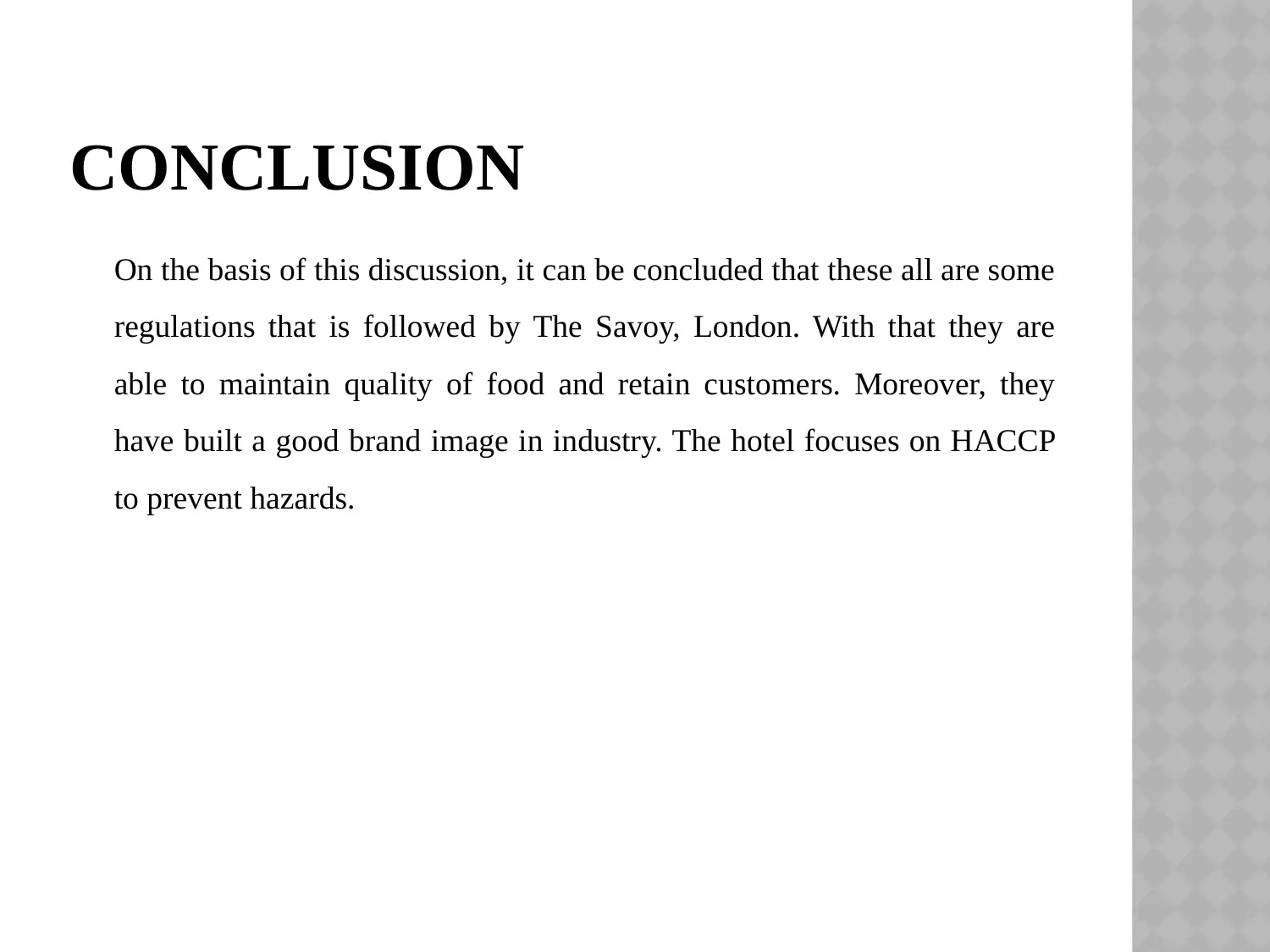
CONCLUSION
On the basis of this discussion, it can be concluded that these all are some
regulations that is followed by The Savoy, London. With that they are
able to maintain quality of food and retain customers. Moreover, they
have built a good brand image in industry. The hotel focuses on HACCP
to prevent hazards.
On the basis of this discussion, it can be concluded that these all are some
regulations that is followed by The Savoy, London. With that they are
able to maintain quality of food and retain customers. Moreover, they
have built a good brand image in industry. The hotel focuses on HACCP
to prevent hazards.
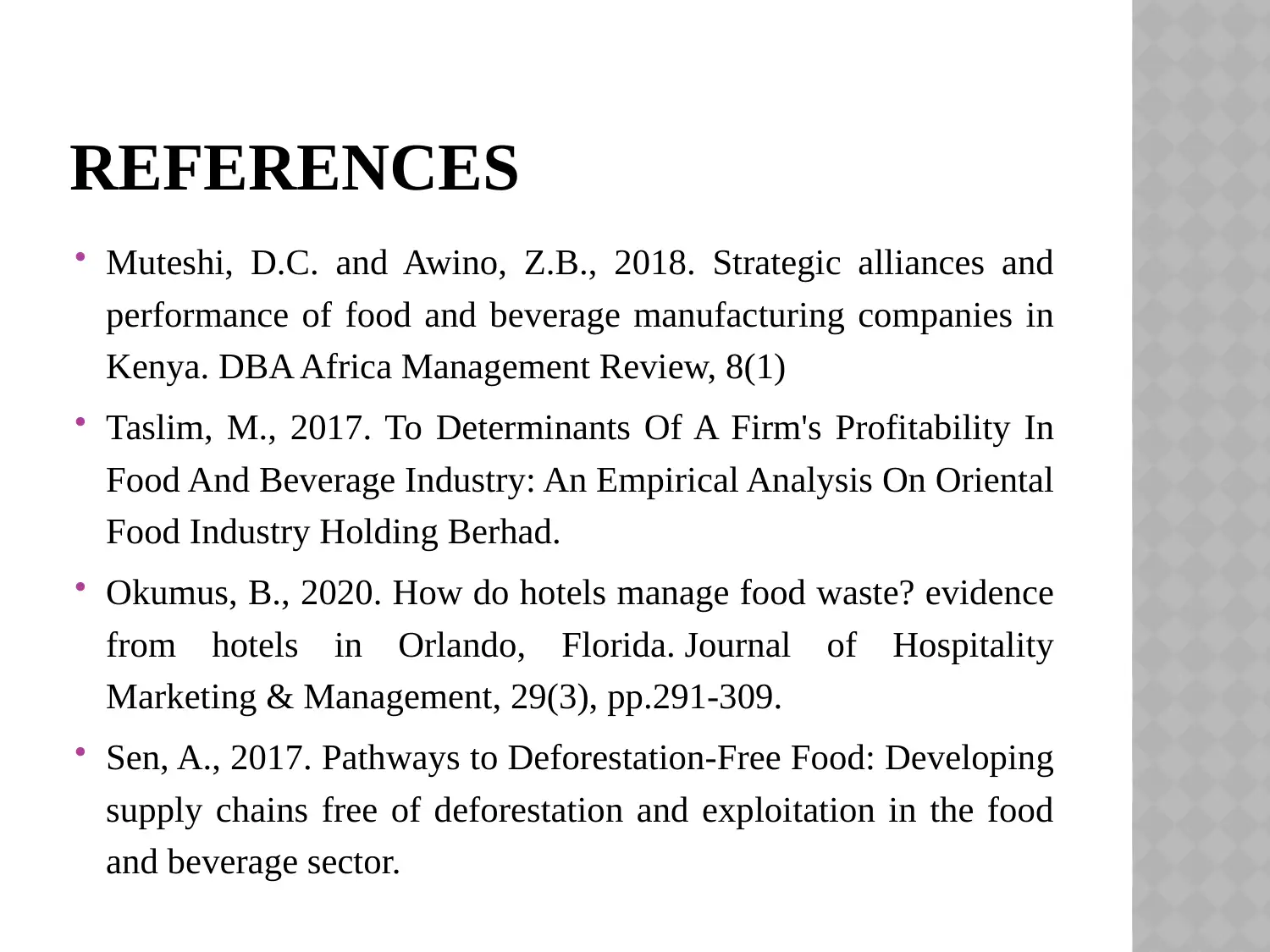
REFERENCES
Muteshi, D.C. and Awino, Z.B., 2018. Strategic alliances and
performance of food and beverage manufacturing companies in
Kenya. DBA Africa Management Review, 8(1)
Taslim, M., 2017. To Determinants Of A Firm's Profitability In
Food And Beverage Industry: An Empirical Analysis On Oriental
Food Industry Holding Berhad.
Okumus, B., 2020. How do hotels manage food waste? evidence
from hotels in Orlando, Florida. Journal of Hospitality
Marketing & Management, 29(3), pp.291-309.
Sen, A., 2017. Pathways to Deforestation-Free Food: Developing
supply chains free of deforestation and exploitation in the food
and beverage sector.
Muteshi, D.C. and Awino, Z.B., 2018. Strategic alliances and
performance of food and beverage manufacturing companies in
Kenya. DBA Africa Management Review, 8(1)
Taslim, M., 2017. To Determinants Of A Firm's Profitability In
Food And Beverage Industry: An Empirical Analysis On Oriental
Food Industry Holding Berhad.
Okumus, B., 2020. How do hotels manage food waste? evidence
from hotels in Orlando, Florida. Journal of Hospitality
Marketing & Management, 29(3), pp.291-309.
Sen, A., 2017. Pathways to Deforestation-Free Food: Developing
supply chains free of deforestation and exploitation in the food
and beverage sector.
⊘ This is a preview!⊘
Do you want full access?
Subscribe today to unlock all pages.

Trusted by 1+ million students worldwide
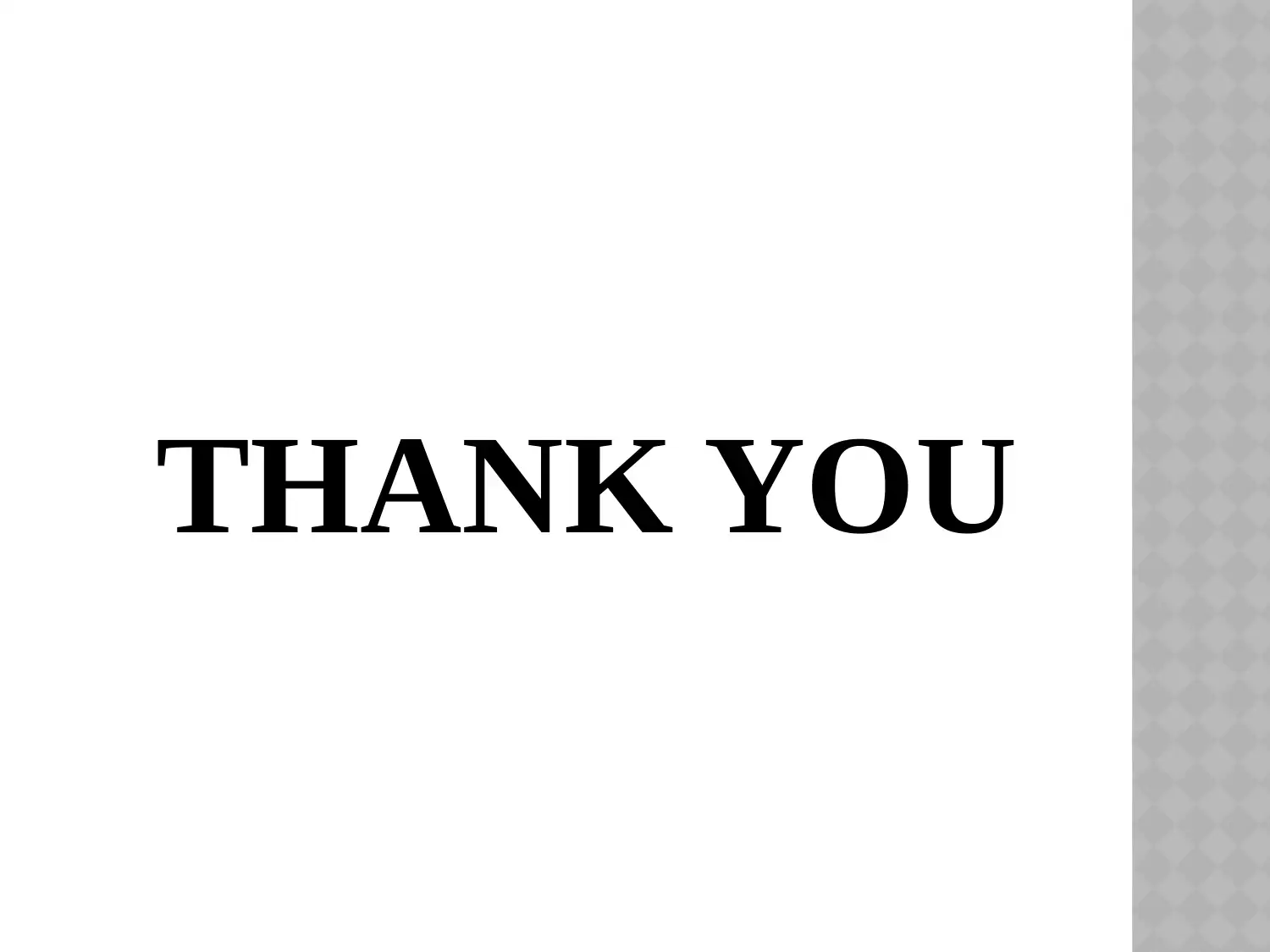
THANK YOU
1 out of 10
Related Documents
Your All-in-One AI-Powered Toolkit for Academic Success.
+13062052269
info@desklib.com
Available 24*7 on WhatsApp / Email
![[object Object]](/_next/static/media/star-bottom.7253800d.svg)
Unlock your academic potential
Copyright © 2020–2025 A2Z Services. All Rights Reserved. Developed and managed by ZUCOL.



